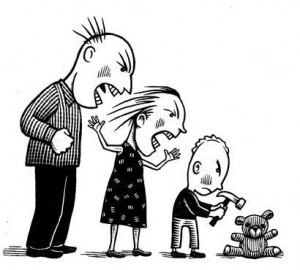Physical punishment should not be used on any child, at any age
 Recent research in the United States reveals that children who are spanked, hit, or pushed as a means of discipline may be at an increased risk of mental problems in adulthood. These may include mood and anxiety disorders, drug and alcohol abuse.
Recent research in the United States reveals that children who are spanked, hit, or pushed as a means of discipline may be at an increased risk of mental problems in adulthood. These may include mood and anxiety disorders, drug and alcohol abuse.
The study is one of the first of its kind. It show a link between non-abusive physical punishment and several different types of mental disorders, according to epidemiologist Tracie Afifi, lead author of the study in today’s Pediatrics. In the past, it was established that physical and sexual abuse, emotional neglect, and other severe forms of maltreatment in childhood are associated with mental illness, but light punishment was not studied.
“There is a significant link between the two,” says Afifi, an assistant professor of epidemiology in the Department of Community Health Sciences at the University of Manitoba, Canada. “Individuals who are physically punished have an increased likelihood of having mental health disorders.” Approximately 2% to 7% of mental disorders in the study were linked to physical punishment.
The study’s findings add evidence to the argument that “physical punishment should not be used on any child, at any age,” she says.
During the research, Afifi and colleagues analyzed data from a government survey of 35,000 non-institutionalized adults in the USA, collected between 2004 and 2005.
About 1,300 of the respondents, all over age 20, were considered to have experienced physical punishment as children. They reported that they had, sometimes or more often, been “pushed, grabbed, shoved, slapped or hit by your parents or any adult living in your house.”
But some family researchers argue that spanking, used properly, can be appropriate discipline.
“Certainly, overly severe physical punishment is going to have adverse effects on children,” says psychologist Robert Larzelere, of Oklahoma State University, Stillwater. “But for younger kids, if spanking is used in the most appropriate way and the child perceives it as being motivated by concern for their behavior and welfare, then I don’t think it has a detrimental effect.”
A 2005 scientific review he co-authored, of studies comparing spanking with non-physical discipline methods, identified an “optimal type of physical discipline,” referred to as conditional spanking, and said that when it was used as a backup to nonphysical discipline it was better at reducing noncompliance and antisocial behavior.
While the new study rules out the most severe cases of physically lashing out at children, , “it does nothing to move beyond correlations to figure out what is actually causing the mental health problems,” says Larzelere. He criticized the study’s reliance on memories of events from years earlier, and says it’s not clear when punishment occurred. “The motivation that the child perceives and when and how and why the parent uses (spanking) makes a big difference. All of that is more important than whether it was used or not.”
Afifi acknowledges that it’s difficult to change people’s mind on this topic, but says “we’re confident of the reliability of our data, and the data strongly indicate that physical punishment should not be used on children – at any age. And it’s important for parents to be aware of that.”
Parents’ right to use physical punishment has been abolished in more than 30 nations, but not in the USA or Canada, says the Global Initiative to End All Corporal Punishment, endorsed by the United Nations and others.






























